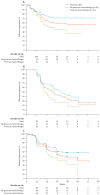Antitumour activity of MDV3100 in castration-resistant prostate cancer: a phase 1-2 study
- PMID: 20398925
- PMCID: PMC2948179
- DOI: 10.1016/S0140-6736(10)60172-9
Antitumour activity of MDV3100 in castration-resistant prostate cancer: a phase 1-2 study
Abstract
Background: MDV3100 is an androgen-receptor antagonist that blocks androgens from binding to the androgen receptor and prevents nuclear translocation and co-activator recruitment of the ligand-receptor complex. It also induces tumour cell apoptosis, and has no agonist activity. Because growth of castration-resistant prostate cancer is dependent on continued androgen-receptor signalling, we assessed the antitumour activity and safety of MDV3100 in men with this disease.
Methods: This phase 1-2 study was undertaken in five US centres in 140 patients. Patients with progressive, metastatic, castration-resistant prostate cancer were enrolled in dose-escalation cohorts of three to six patients and given an oral daily starting dose of MDV3100 30 mg. The final daily doses studied were 30 mg (n=3), 60 mg (27), 150 mg (28), 240 mg (29), 360 mg (28), 480 mg (22), and 600 mg (3). The primary objective was to identify the safety and tolerability profile of MDV3100 and to establish the maximum tolerated dose. The trial is registered with ClinicalTrials.gov, number NCT00510718.
Findings: We noted antitumour effects at all doses, including decreases in serum prostate-specific antigen of 50% or more in 78 (56%) patients, responses in soft tissue in 13 (22%) of 59 patients, stabilised bone disease in 61 (56%) of 109 patients, and conversion from unfavourable to favourable circulating tumour cell counts in 25 (49%) of the 51 patients. PET imaging of 22 patients to assess androgen-receptor blockade showed decreased (18)F-fluoro-5alpha-dihydrotestosterone binding at doses from 60 mg to 480 mg per day (range 20-100%). The median time to progression was 47 weeks (95% CI 34-not reached) for radiological progression. The maximum tolerated dose for sustained treatment (>28 days) was 240 mg. The most common grade 3-4 adverse event was dose-dependent fatigue (16 [11%] patients), which generally resolved after dose reduction.
Interpretation: We recorded encouraging antitumour activity with MDV3100 in patients with castration-resistant prostate cancer. The results of this phase 1-2 trial validate in man preclinical studies implicating sustained androgen-receptor signalling as a driver in this disease.
Funding: Medivation, the Prostate Cancer Foundation, National Cancer Institute, the Howard Hughes Medical Institute, Doris Duke Charitable Foundation, and Department of Defense Prostate Cancer Clinical Trials Consortium.
Copyright 2010 Elsevier Ltd. All rights reserved.
Conflict of interest statement
Figures



Comment in
-
Revisiting the ultimate target of treatment for prostate cancer.Lancet. 2010 Apr 24;375(9724):1409-10. doi: 10.1016/S0140-6736(10)60400-X. Epub 2010 Apr 14. Lancet. 2010. PMID: 20398924 No abstract available.
-
Prostate cancer: MDV3100 has antitumor activity in castration-resistant disease.Nat Rev Urol. 2010 Jun;7(6):300. doi: 10.1038/nrurol.2010.69. Nat Rev Urol. 2010. PMID: 20545033 No abstract available.
-
Words of wisdom. Re: Antitumour activity of MDV3100 in castration-resistant prostate cancer: a phase 1-2 study. Scher HI, Beer TM, Higano CS, et al. Prostate Cancer Foundation/Department of Defense Prostate Cancer Clinical Trials Consortium.Eur Urol. 2010 Sep;58(3):464-5. doi: 10.1016/j.eururo.2010.06.018. Eur Urol. 2010. PMID: 20845529 No abstract available.
References
-
- Benvenuti S, Sartore-Bianchi A, Di Nicolantonio F, Zanon C, Moroni M, Veronese S, et al. Oncogenic activation of the RAS/RAF signaling pathway impairs the response of metastatic colorectal cancers to anti-epidermal growth factor receptor antibody therapies. Cancer Res. 2007 Mar 15;67(6):2643–8. - PubMed
-
- Linardou H, Dahabreh IJ, Kanaloupiti D, Siannis F, Bafaloukos D, Kosmidis P, et al. Assessment of somatic k-RAS mutations as a mechanism associated with resistance to EGFR-targeted agents: a systematic review and meta-analysis of studies in advanced non-small-cell lung cancer and metastatic colorectal cancer. Lancet Oncol. 2008 Oct;9(10):962–72. - PubMed
-
- Cortes J, Jabbour E, Kantarjian H, Yin CC, Shan J, O'Brien S, et al. Dynamics of BCR-ABL kinase domain mutations in chronic myeloid leukemia after sequential treatment with multiple tyrosine kinase inhibitors. Blood. 2007 Dec 1;110(12):4005–11. - PubMed
Publication types
MeSH terms
Substances
Associated data
Grants and funding
LinkOut - more resources
Full Text Sources
Other Literature Sources
Medical

